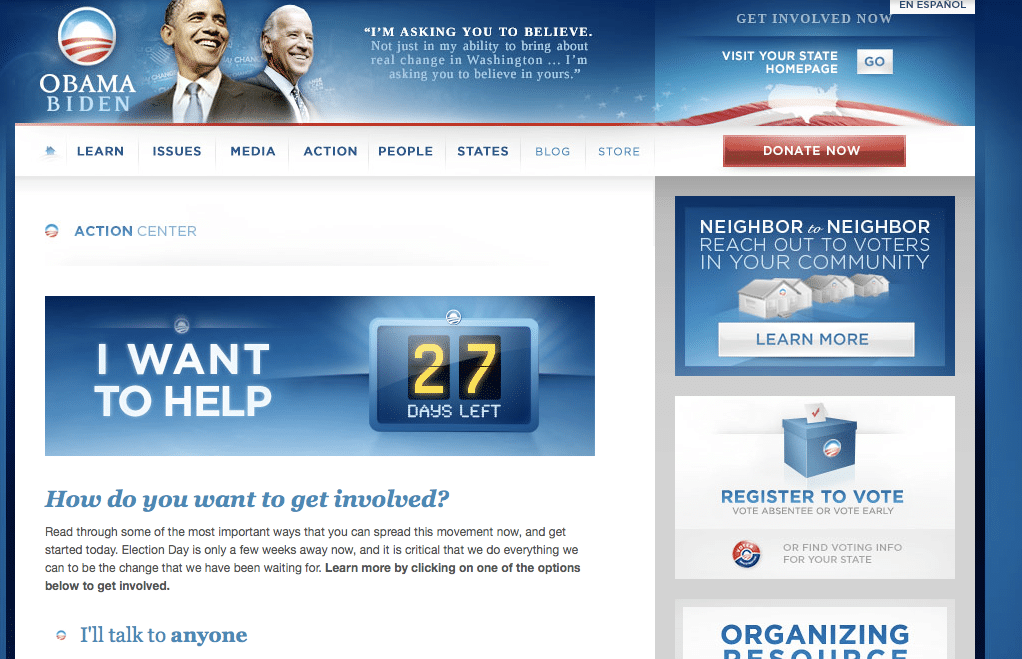The keynote speaker of Saturday’s conference was Zack Exley who is pretty much The Guy you want to get in to run your campaign if you’re serious about running for political office. He directed the online campaign for the British Labor Party’s 2005 re-election, was Director of Online Organising and Communications at Kerry-Edwards 2004 and before that was an adviser to the early Howard Dean campaign. He spoke about Dean and how his use of the internet changed politics. That’s all well and good but it’s history! I was more interested in what he had to say about Obama’s use of online to engage communities.
When you first visit the Obama website, you can’t get in without giving your email, your name and your postcode. I didn’t see any footnote about how my vitals will be used and whether or not I’ve now subjected myself to a whole heap of communication, but I’ll report back on that later.
The next page is trying to get you to donate. “Contribute today and help change Washington”. There’s a big form on the right crying out for me to give it my credit card details. It’s also asking me to quality myself further – they want to know my employer and my occupation.
Interior Pages of Obama.com. Says Zack:
Once you get into the website the calls to action are very clear. There are hundreds of thousands of people taking these actions. It’s not just about donating. Neighbour to neighbour campaigns are pretty interesting….
Neighbour to Neighbour Campaign : Utlising Freely Available Election Lists in a Web Savvy Way
Built on the belief that everyday Americans, once organized, can change their country.
Supporters are encouraged to log in, print walk lists and get on the phone or start knocking on doors. Walk lists are lists culled from voter registration lists of all the people in your area who are registered to vote. You can download scripts to use when knocking on doors or making phone calls. There are flyers you can print off and leave behind. And most importantly, there’s an interface to collect all the data:
- Who did you visit?
- What they did ? Signed card, support Obama, leaning voter, etc
- What did you go? Speak with the voter, asked me not to come back, etc.
This field campaign is highly organised and is bringing together all sorts of people towards a common goal. There’s volunteer training where the motto of “Include and Respect” is instilled in everyone and a T-shirt at the end of it. There are a variety of roles to suit everyone. And all of this valuable information is input into the system and available to view at campaign HQ in real time. All of this was done in 2004 during the Kerry campaign but the information was lost. The difference now is that the tools have made it into volunteer’s homes to connect them to the main database. Most are using Google spreadsheets and sharing with their next in command.
I can imagine how this information will be used. Swing voters will be revisited closer to the date of the election. Perhaps a visit by a more persuasive operative/volunteer. Homes with non-English speakers will be assigned a foreign language volunteer.
It sure is impressive. Not least for the organisation, but also for the fact that it’s rallying people who never knew each other before to work towards a common goal. I’m almost wishing we had the same kind of thing in Ireland…
But we do. And it’s called canvassing
So said Suzybie during questions. However, I disagree. I don’t think it’s comparing like with like because Obama’s community campaigning is open to anyone. Just log on and get involved. I’ve lived in Ireland for a large part of my life and I wouldn’t have a clue how to get involved with canvassing in the run-up to an election or a referendum. Would you?
I imagine you’d have to show up at long dull meetings in draughty rooms attended by men with little hair and grey suits. Pay your dues. Toe the party line. Hardly an attractive proposition.
But Libertas’ successful Lisbon campaign showed that Irish people will respond with their ballots to a well thought out and communicated campaign. I personally found it offensive that the main political parties simply wheeled out their leftover election posters and stuck the word Lisbon at the bottom of them.
With questions being asked about the fruits of the last decade of economic growth (or lack of them), maybe the time is right to introduce Obama-style community campaigns to this country? Maybe the introduction of web-savvy campaigning will bring some much-needed new blood and ideas to politics on this side of the Atlantic.
As Zack concluded,
Obama should never have gotten the nomination. He’s too new. An outsider. And African American. He would have been rejected as a radical in the past. But because of the ability of mavericks such as Obama to raise money online, he’s been able to run.
And sure we might even see him as President…
Which begs the very interesting question indeed… if Obama is supported by the blogosphere as he attempts to enter office. What happens once he’s in office? What happens when he’s making decisions that are tough to bear or unpopular amongst certain groups? What then? Will the bloggers continue to support him? Or will they start blogging to get him out?


